
In this article, I’ll tell you all the things you can do to reduce guitar string noise on your acoustic and electric guitar. It doesn’t matter what genre of music you play. The same general principles apply to everything from classical music and heavy metal!
Keep reading to learn what you can do to give all your music the clarity it deserves!
You can use the table of contents below to take you to the area that interests you. Click on the little box to open it and then click on the section of the article you want to read, or you can read from start to finish if you want the full string-noise control experience!
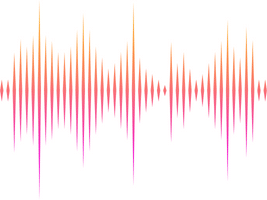
What Is The String Noise?
Very simply, any unwanted sound your guitar strings make that is not part of what you are trying to play is string noise.
I’m talking about those annoying squeaks and rubs your fingers make as they move along the guitar strings or the undampened notes and rogue harmonics that appear as you tap out a guitar solo.
Anything that doesn’t belong there is string noise, even if it sounds good!
The biggest problem with string noise is that it robs your music of the clarity it deserves.

Noise Prevention Checklist
- Wash your hands before you play if they look or feel dirty
- Clean your strings thoroughly (don’t forget the underside) after each time you play!
- Routinely use a string cleaner and lubricant
- Keep a soft (microfiber) clean cloth in your guitar case
- Change your strings whenever they start to become noisy or lose tone and brightness
- Clean your frets, fingerboard, and neck whenever you change guitar strings
Keep On Reading To Learn More!

Distortion Is Not Always Noise!
When I first started playing, I was like the guy pictured above playing the Flying V guitar. I thought that it was all good if it was loud, distorted, and fast!
It’s easy to fall into the trap of using your distortion pedal or high-gain amplifier to hide the inaccuracies of your playing technique. The paradox is that the more distortion you use in your music, the cleaner each note has to be played to have it sound awesome!
Listen to the masters of heavy metal like Joe Satriani or Steve Vai. No matter how much distortion they use, you can hear every note ring out clearly because their playing is meticulous!

Causes Of Guitar String Noise
Here are some of the most common things that make your guitar strings noisy. Be on the lookout for them and keep them from affecting the quality of your playing whenever possible.
Dirty And Worn-Out Strings
As guitar strings age, they can become dirty, pitted, and corroded. Playing on dirty or worn-out strings can make it more difficult to sound all the notes quietly, no matter how well you play the guitar. Pitted and corroded strings can damage your frets!
Oil, sweat, and dead skin from your fingers can accelerate the process. Using wrist sweatbands can help keep your hands and fingers dry.
It’s essential to keep your strings clean. Wipe them down with a lint-free cloth after each use. Be sure to wipe the tops, sides, and bottoms. You might be surprised how much dirt and grime can accumulate on the bottom of your strings!
Dirty strings are not only noisier, but they also ring out less clearly!
Dirty Frets And Fingerboard
Dirt on your frets and fingerboard can rub off on your fingers while you play, making your strings dirty. If your frets are worn out, dented, scratched, or uneven, they can cause noise, especially during string bending.
Worn-out frets may need to be filed and crowned or replaced to eliminate the string noise. Never attempt to do this without the proper training, or you could create a serious problem!
Always clean your neck, including the frets and fingerboard, after each time you play. You can use a string cleaner and lubricant (more about this later) to help keep your strings clean and noise-free.
Be sure that the cleaner or polish is ok to use on your fingerboard wood (maple, rosewood, ebony, pau ferro, etc.) to avoid damaging it. For more info, see Why Change Guitar Strings? – Tips To Play And Sound Awesome! and Guitar Polish Review – 8 Best Products To Shine And Protect!
Poor Playing Technique
A poor playing technique is one of the most common causes of string noise.
Pressing too hard or not hard enough or too close to a fret and picking or plucking the strings too hard can cause string buzz.
Sliding the fingertips instead of lifting them can cause string squeak.
Not dampening or muting unplayed strings can produce unwanted notes or harmonics.
Guitar Not Properly Adjusted
A guitar that is not correctly adjusted can cause string buzz.
Setting the string height (action) too low to the surface of the frets can cause buzzing. This will require a height adjustment at the bridge.
The open strings can buzz if the guitar nut is too low, especially the three thickest strings.
A guitar neck with the relief (degree of curvature) set incorrectly can require a truss rod adjustment to remove string buzz. Never adjust the truss rod unless you know the proper procedure, or you could permanently damage the neck!
String Type
Some types of strings can be more likely to create noise than others. Wound (bass) strings are more challenging to play quietly than plain (unwound) strings.

The wound strings can be round-wound, ground-wound (half-round), flat-wound, and coated.
Round-wound strings have a round metal wire wound around an inner metal core. They can be the noisiest but give a tighter and brighter bass sound, making them more popular for genres like rock, blues, and metal.

Ground-wound (half-round) strings have an outer metal wrap that is ground flat on the string’s outside and round on the inside. This gives these strings the sound characteristics between a round-wound and a flat-wound configuration while making them less noisy than round-wound but brighter than flat-wound.
Flat-wound strings have a flat outer winding to decrease string squeak, but they are not as tight and bright sounding as round wound strings, making them more popular among jazz players.

Coated strings have an outer coating that makes them play quieter and last longer. They are very popular among acoustic players
Worn Out Picks
When guitar picks wear out, they can become misshapen and develop cracks or grooves that can add noise to a string when it is picked.
The size, shape, thickness, and material of a pick can all affect how you play. Find a pick that allows you to play comfortably and with the least amount of noise.
Dry Hands, Rough Callouses, And Fingernails
Players with dry or rough hands with fingertip callouses that are not smooth can find it challenging to minimize string noise. Dry and rough skin increases the frictional forces as it slides over the string’s surface.
Keep your hands moisturized and gently smooth rough fingertip callouses with a nail file.
The length and shape of the fingernails on both your fretting and picking hand can affect the amount of string noise. Nails that are too long can make it very difficult to fret notes clearly. Nail shape can add or help minimize noise when fingerpicking strings.

Advantages Of Eliminating Noise
- Makes you sound more professional
- Helps the guitar’s sound stand out among other musicians
- Brings out the guitar’s true tone
- Slows fret wear and prevents damage
- Allows the recording engineer to bring your track more forward in the mix
- Helps hold the audience’s interest, especially during a guitar solo

Disadvantages Of String Noise
- May be difficult to hear all notes of a chord
- Extraneous notes and sounds can create dissonance
- Fast passages and solos can sound sloppy
- Notes may “run together” while using distortion
- Undue mechanical stress can shorten string life

Practicing To Eliminate String Noise
The best way to learn to play with minimal or no string noise is to closely observe and critique your guitar technique.
If you use an electric guitar, play it unplugged or use a clean setting on your guitar amplifier without any effects.
Begin by playing slowly and take note of what you’re doing that creates string noise. Are you playing single notes, chords, or both? Is it when you press down or move your fingers on the fretboard or when you pick the notes? Where on the neck are you playing?
Use A Metronome
Use a metronome to keep the tempo (speed) of your playing constant. Try to slow it down to a pace where you hear minimal or no string noise. This is where you want to begin!
If you hear string buzzing, try pressing your fingers down harder or not as hard between the frets. If you can’t make the buzzing go away, your guitar may need an adjustment (string height too low, etc.). You can try using another guitar if you have one to see if the problem goes away.
Practice lifting your fingers between each note or chord change if you hear a squeaking or rubbing sound. If you are sliding into another note or chord, apply less pressure to the strings.
If you find it difficult to isolate the problem, you can video yourself playing and carefully watch the fingers on both hands.
Speed Up Slowly
When the string noise in your playing sounds ok, speed up the metronome by about five beats per minute (bpm) and repeat the process until you can play the song up to tempo without string noise.
If you don’t have a metronome, you can get a free smartphone app or use a free online metronome.
For more info, see Learn To Play A Guitar Fast – Best Tips And Tricks!
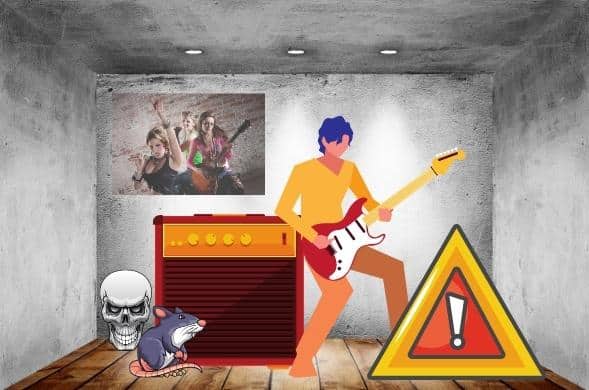
Listen From The Audience!
Once you have improved your string noise, it’s essential to be sure that it sounds ok from out in the audience or on a recording.
Record yourself from a distance that approximates where your audience will be and listen for sting noise. Play several songs in your repertoire that are at different speeds and styles.
If you play with effects, try songs that use things like reverb, echo, overdrive, and distortion. Also, listen for unwanted harmonics and feedback.
String Lubricants And Cleaners
Besides improving your playing technique, there are various string lubricants and cleaners you can use to help minimize string noise and keep your strings sounding great.
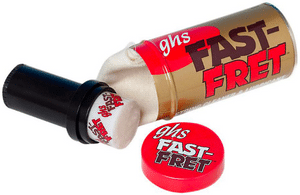
GHS Fast Fret
I started using Fast Fret way back in high school! It is an excellent sting cleaner and does reduce string squeak with regular applications. I don’t really notice an increase in how fast I can play. It is an excellent product and won’t harm your fretboard!
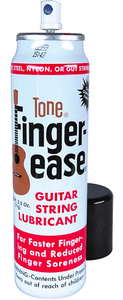
Tone Finger-Ease
I have used Tone Finger-Ease off and on for years.
Like Fast Fret, it’s a good product for cleaning your strings and reducing various squeaky sounds, especially when playing fast passages.
Unlike Fast Fret, it sprays on instead of rubbing on with an applicator, so you don’t get as many applications.
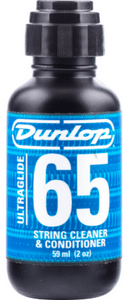
Dunlop 6582 UltraGlide 65 String Cleaner
Dunlop Ultraglide is another good cleaner, string life extender, and squeak reducer. It goes on the strings with a built-in applicator.
Some players have claimed that it has made their strings last up to three times longer.
There have been a few claims that it could damage the fretboard’s surface if it is allowed to remain on the surface. I have used it several times on rosewood and maple fingerboards with no issues.
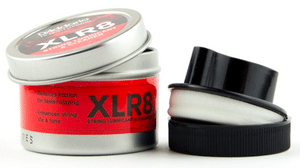
D’Addario XLR8 String Cleaner & Conditioner
This string cleaner and lubricant comes in a can with an easy to hold applicator. It claims to enhance string life and tone while reducing friction for faster playing. XLR8 lubricates your strings as it cleans to reduce squeak.
This is another product I really like because it significantly reduces string squeak and seems to stay on the strings, even during heavy use. The airtight metal tin keeps it from drying out.

Lizard Spit Fresh-N-Easy String Cleaner & Protector
Lizard Spit is an unusual name, to be sure! It claims to give your strings a “spit shine” and longer life. The bottle comes with a built-in applicator. It’s “hand-blended in small batches” to be non-toxic, biodegradable, and environmentally friendly and contains a string rust inhibitor.
Lizard Spit promises to give you “easier playing” and “faster shredding” strings with only a single application.
String Dampeners For Tapping
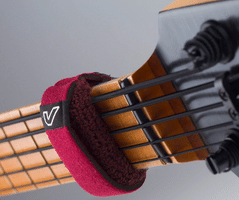
When you tap out notes on your guitar, it’s essential to minimize noise and unwanted harmonics from other strings.
Some guitar players think that using a string dampener is a must if you do a lot of finger tapping, especially two-handed. It really depends on your particular playing style, musical genre, and the guitar and effects you use.
Eddie Van Halen, who essentially invented a new approach to rock and metal, was a master tapper, and I’ve never seen him use a string dampener. I’ve seen Joe Satriani use his right hand as a string dampener when tapping notes higher up on the neck.
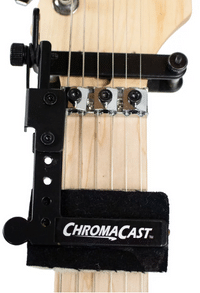
Jennifer Batten uses a string dampener, and she gets an incredible sound!
There are basically two types of string dampeners. They both have their advantages and disadvantages.
The first type slips over the guitar neck and sits between any two frets. It takes longer to disengage it from the strings, but it is inexpensive and not attached to the headstock.
The second type attaches to the headstock and swings down over the strings in the first or second fret. It is easy to engage and disengage but is attached to the guitar and can be expensive to purchase.
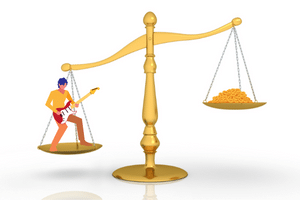
Is Digital Noise Removal Legit?
Digital recording studio software can improve or remove unwanted string noise by using “micro-automation” to lock in on the noisy parts of the audio signal.
Most recording software can do this on a fundamental level, and sophisticated plugins are available to do a better job.
If you record for commercial consumption, this is a viable option, but it will not help you with a live performance. It’s always best to learn how to minimize string noise while playing and then take advantage of digital recording software to help with whatever noise remains.

Key Takeaways
- Distortion is not the same as noise
- Some string noise may be from poor playing technique
- Different string types (round-wound, etc.) can affect string noise
- Guitar picks can wear out and affect playing technique
- Keep your hands soft and dry – wristbands can help with sweat when playing
- Practice slowly with a metronome and record yourself to help reduce string noise
- A string dampener can help reduce noise and unwanted harmonics when tapping notes
- Get your guitar adjusted at least once a year, or if your strings become noisy (even after replace them with a new set)
- Don’t attempt to adjust your guitar if you don’t know the proper method (bring it to a certified guitar tech)
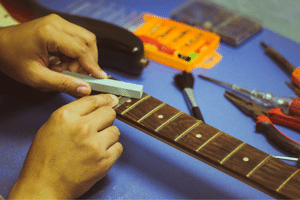
Are You Qualified To Make Guitar Adjustments Or Modifications?
It’s great to work on your guitars, especially if you have a lot of them, but you should always be aware of your limitations.
Adjusting things like an electric guitar’s string height (action) or pickup height can be straightforward. Still, some adjustments require the proper training and experience, like adjusting a guitar’s truss rod.
When you doubt your ability to adjust, repair, or modify your guitar, it’s always best to bring it to a competent guitar technician or luthier (guitar designer & builder). You can permanently damage your guitar, and it might never play and sound right again!
Making modifications to your guitar can void its manufacturer’s warranty and cause permanent damage to the instrument. Certain modifications are irreversible, so you may be stuck with them, even if you desperately want to restore the guitar to its original condition!
I learned that the hard way over the years until I did a three-year apprenticeship in a guitar repair shop. Now I have my own home workshop with the proper training and equipment to safely maintain and repair all my instruments.
Remember: “When In Doubt, Send It Out!” If your guitar is not set up correctly, you may never get rid of the string noise, no matter how much you improve your playing technique!

Frequently Asked Questions
Here are some of the questions I get asked about guitar string noise.
If your question does not appear here, please put it in the comments, and I will get right back to you with an answer.
How Do You EQ Out String Noise?
You can’t totally remove string noise by changing equalization settings, but you may be able to soften it. A digital audio workstation (DAW) will work best. See the section above on “Is Digital Noise Removal Legit?”
What Frequency Is Guitar String Noise?
Most guitar string noise tends to be in the lower frequencies found on the low E, A, and D strings since these are the wound strings. If you use a wound G string, this string can also significantly contribute to string noise.
Why Are My Strings Touching The Frets?
If your strings are touching the frets when you are not pressing down on them, your guitar needs to be adjusted. The guitar might need a string height or a truss rod adjustment.
Why Does My Guitar Stop Buzzing When I Touch It?
This sound is not from mechanical string buzz. It is an electrical hum. It could be from the guitar pickups sensing an electromagnetic signal from something like fluorescent lighting or a grounding problem (loop) with the guitar amplifier.
Adding “shielding” to your guitar cavity and using “noiseless” pickups will help significantly.
How Do You Get Low Action Without Fret Buzz?
You can try using a thicker gauge string set and picking the strings easier (less aggressively). If that doesn’t work, the neck might need a truss rod adjustment, or you could have to raise the strings up a little.
Should Guitar Strings Touch The Fretboard?
No, you should not have to press the strings down hard enough to make them touch the fretboard. You might have to change your playing technique, or the guitar might need an adjustment.
Can I Adjust The Truss Rod With Strings On?
Yes, but you should loosen the strings enough to take the tension off the neck. Don’t attempt to adjust the truss rod if you are unfamiliar with doing it correctly.
Which Way Do I Turn The Truss Rod To Stop Buzzing?
That depends on why the neck is causing string buzz. Both a bowed neck and a back-bowed neck can cause string buzzing.
To decrease the bow, turn the truss rod clockwise. To decrease the back-bow, turn the truss rod counter-clockwise. Don’t mess with the truss rod if you don’t know what you’re doing!
Is A Little Fret Buzz Normal?
Normally, you should not hear any fret buzz, assuming you are not picking the strings too aggressively. Some players tolerate a little fret buzz to have a very-low string action. A little fret buzz might not be heard through the amplifier of an electric guitar.

Final Thoughts
I hope you found this article valuable! Guitar string noise is one of the most common problems players encounter!
Following simple preventative measures, like keeping your strings and guitar neck clean and changing guitar strings when they wear out, can help prevent or improve many string noise problems.
It’s essential to work on your fingering technique to eliminate or reduce all squeaks and buzzes from your playing. Guitar string squeaks are usually from playing technique, while buzzes can be from technique or a guitar adjustment issue.
Practice slowly with a metronome to eliminate string noise and progressively increase your speed until you can play a song or difficult passage up to tempo.

Don’t try to use distortion or other guitar effects to cover up string noise. Learn to play each note clearly, which will make your distorted power chords and solos sound articulate and awesome!
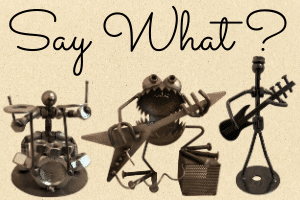
Tell Me What You Think
Please leave a comment below if you enjoyed this article, have any questions about how to reduce guitar string noise, or want to give your point of view. I will be happy to help you.
- What practice technique has worked best for you to eliminate string noise?
- How often do you have your guitar adjusted? Do you do it yourself?
- Are you using a string cleaner and lubricant? Which one?
- After reading this article, will you change how you practice or play the guitar?



This is really interesting I didn’t realise there were so many products that could help when this becomes a issue. It will definitely be worth buying one for my nephews guitars and some great information that Peter sure would find helpful with his tests coming up.
I didn’t even realise some of these causes could actually be the root of a distortion noise problem.
Hi, Maria
Thank You for your comments!
I’m very happy you found my article interesting, and I hope it will help improve your nephew’s guitar playing.
The problem with string noise as it applies to distortion as a guitar effect is a little different than the way you are thinking about it. Guitar players who use distortion as a sound effect for their rock or blues guitar solos need to be very careful about extraneous guitar noise, or it will diminish the quality of their distorted sound.
Frank
Thanks for the great info Frank! As a beginner I struggle with string noise. Now I know I need to clean my strings and hands for sure. And, I have a bad tendency to slide my fingers along the strings looking for the next note.
That is creating a lot of squeak. Do you have any advice for a beginner on how to break that bad habit? I’m sure continued practice will help, but the squeak is not only annoying but distracting as well.
Thanks,
Rex
Hi, Rex
Thank You for your comments and question.
Sliding your fingers is a bit of a challenging habit to break. Unless you are purposely sliding in or out of a note(s) to get a particular sound, always lift your fingers off the strings. You don’t have to lift them high, or you will lose speed and agility, so just high enough to mute or eliminate the noise.
Practice slowly and with a metronome (you can get a free smartphone app or use a free online metronome). Play as slow as it takes to kill the squeak. The metronome keeps you in-time and prevents you from speeding up. When you can play repeatedly and comfortably without string noise, speed up the metronome in 5 bpm intervals until you’re fully up to speed.
The key to precision and accuracy with speed is always to practice slowly and build up.
Keep on Playing!
Frank 🎸
The article was very long but detailed. Even though I was not familiar with the topic. It was broken down into such detail that I only had to read to find out more about the thing I was interested in. The images also were enticing, even if they were targeted at a certain group. I could tell right away that I had to be a music lover, first, then a guitar buff. The site will also act as a nice glossary of terms and artist types. By the way the title did capture my attention, and made me think why did he say that? Overall it was a long, but complete article that answered the customers questions with fun.
Hi, Rosa
Thank You for your comments! Very much appreciated!
Yes, my articles tend to be on the long side for completeness. It’s not really information that would help the general public, but maybe I have enticed you to start playing the guitar. You don’t have to spend a lot of money to get going, and there are articles on my website that will help you take the first step. 😀
Frank